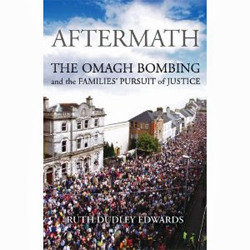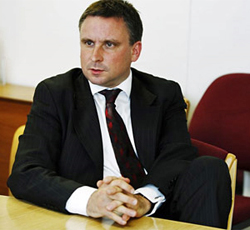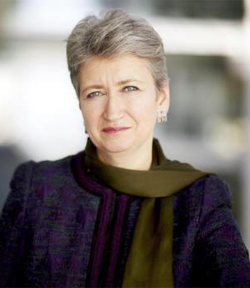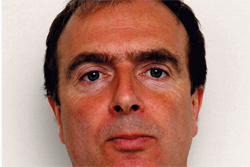Posted on October 15, 2010 by The Orwell Prize -

Nigeria is a country where petroleum prices and polio are both booming, where small villages challenge giant oil companies, and scooter drivers run their own mini-state. The oil-rich Delta region at the heart of it all is, as Peel shows us, a troublespot as hot as the local pepper soup. Through a host of characters, from the prostitutes of Port Harcourt to the Area Boys of Lagos, from the militants in their swamp forest hide-outs to the oil company executives in London, Peel tells the story of this extraordinary country, which grows ever more wild and lawless by the day as its crude oil pumps through our cities.
Posted on October 15, 2010 by The Orwell Prize -

A woman in a township in Zimbabwe is surrounded by throngs of dusty children but longs for a baby of her own; an old man finds that his job making coffins at No Matter Funeral Parlour brings unexpected riches; a politician’s widow quietly stands by at her husband’s funeral watching his colleagues bury an empty coffin. Petina Gappah’s characters may have ordinary hopes and dreams, but they are living in a world where a loaf of bread costs half a million dollars; a country expected to have only four presidents in a hundred years; and a place where people know exactly what will be printed in the one and only daily newspaper because the news is always, always good. In her spirited debut collection, Zimbabwean author Petina Gappah brings us the resilience and inventiveness of the people who struggle to live under Robert Mugabe’s regime. Despite their circumstances, the characters in An Elegy for Easterly are more than victims; they are all too human, with as much capacity to inflict pain as they have to endure it. They struggle with larger issues common to all people everywhere: failed promises, unfulfilled dreams and the yearning for something to anchor them to life.
Posted on October 15, 2010 by The Orwell Prize -

The Omagh bomb was the worst massacre in Northern Ireland’s modern history – yet from it came a most extraordinary tale of human resilience, as families of murdered people channelled their grief into action. As the bombers congratulated themselves on escaping justice, the families determined on a civil case against them and their organisation. No one had ever done this before. It was a very domestic atrocity. In Omagh, on Saturday, 15 August 1998, a massive bomb placed by the so-called Real IRA murdered unborn twins, six men, twelve women and eleven children, of whom two were Spanish and one English: the dead included Protestants, Catholics and a Mormon. Although the police believed they knew the identities of the killers, there was insufficient evidence to bring charges. Taking as their motto ‘For evil to triumph, all that is necessary is for good men to do nothing’, families of ten of the dead decided to pursue these men through the civil courts, where the burden of proof is lower. This is the remarkable account of how these families – who had no knowledge of the law and no money, and included a cleaner, a mechanic and a bookie – became internationally recognised, formidable campaigners and surmounted countless daunting obstacles to win a famous victory. How these mothers and fathers and sisters and brothers turned themselves into the scourge of the Real IRA is not just an astonishing story in itself. It is also a universal story of David challenging Goliath, as well as an inspiration to ordinary people anywhere devastated by terrorism.
Posted on October 15, 2010 by The Orwell Prize -

Ian Cobain is a senior reporter for The Guardian. He won the Paul Foot Award for Campaigning Journalism 2009 for his investigation into British involvement in torture.
Submitted Articles
Other links
Posted on October 14, 2010 by The Orwell Prize -

The seventies are probably the most important and fascinating period in modern British political history. They encompass strikes that brought down governments, shock general election results, the rise of Margaret Thatcher and the fall of Edward Heath, the IMF crisis, the Winter of Discontent and the three-day week. But the seventies have also been frequently misunderstood, oversimplified and misrepresented. When the Lights Went Out goes in search of what really happened, what it felt like at the time, and where it was all leading. It includes vivid author interviews with many of the leading participants, many of them now dead, from Heath to Jack Jones to Arthur Scargill, and it travels from the once famous factories where the great industrial confrontations took place to the suburbs where Thatcherism was created and to remote North Sea oil rigs. The book also unearths the stories of the forgotten political actors away from Westminster who gave the decade so much of its volatility and excitement, from the Gay Liberation Front to the hippie anarchists of the free-festival movement. Over five years in the making, this book is not an academic history but something for the general reader, written with the vividness of a novel or the best works of American New Journalism. No such treatment of the seventies has been previously attempted. Hopefully the book will bring the decade back to life in its all its drama and complexity.
Posted on October 18, 2009 by The Orwell Prize -

The blog of a pseudonymous English detective. After winning the first-ever Orwell Prize for Blogs, Night Jack was revealed to be Richard Horton by The Times following a landmark High Court ruling, The Author of a Blog vs Times Newspapers Limited.
Submitted blogposts
All posts via The Salted Slug’s, Nightjack Archive.
Other links
Posted on October 17, 2009 by The Orwell Prize -

Longlisted for work published by the New Statesman and broadcast by Channel 4. Martin Bright began his journalistic career writing in very simple English for a magazine aimed at French school children. This experience has informed his style ever since. He worked for the BBC World Service, and The Guardian before joining The Observer as Education Correspondent. He went on to become Home Affairs Editor before becoming the New Statesman’s political editor in 2005. He left the New Statesman in January 2009, and started blogging on Spectator.co.uk. He was appointed political editor of the Jewish Chronicle in August 2009.
Submitted articles
Other links
Posted on October 17, 2009 by The Orwell Prize -

Michela Wrong has spent more than 25 years writing about Africa. As a Reuters correspondent in Abidjan
and then Kinshasa, she covered the turbulent events of the mid 1990s, including the fall of Mobutu Sese Seko
and Rwanda’s genocide. She then moved to Nairobi, where she became Africa correspondent for the Financial
Times. Her books include “In the Footsteps of Mr Kurtz”, “I Didn’t Do it for You”, “It’s Our Turn to Eat” and
“Borderlines”, a novel set in the Horn. Now based in London, she is researching a non-fiction book on Rwanda.
Posted on October 17, 2009 by The Orwell Prize -

Paul Vallely writes on social, ethical and religious issues. He is a former executive editor of the Independent on Sunday and of The Sunday Times News Review. He has previously reported from over 30 countries and was the Africa correspondent for The Times. He has written a number of books including Bad Samaritans: First World Ethics and Third World Debt and Promised Lands, a study of land reform in the Philippines, Brazil and Eritrea. He is the editor of The New Politics: Catholic Social Teaching for the 21st Century and A Place of Redemption: a Christian approach to punishment and prison.
Submitted articles
Other links
Posted on October 17, 2009 by The Orwell Prize -

Arkady Ostrovsky is the Moscow Bureau Chief for The Economist, and his longlisted entry also includes work from Prospect. He has also written for other publications including the Financial Times, Foreign Policy and the Los Angeles Times.
Submitted articles
Posted on October 17, 2009 by The Orwell Prize -

Longlisted for work published by the New Statesman. Lindsey Hilsum is Channel 4 News’ International Editor. She has reported from every continent in the world (apart from Antarctica), and is particularly interested in Iran, Afghanistan and Mexico. She was in Baghdad during the 2003 Iraq war, Belgrade during the NATO Kosovo campaign and has worked extensively in Zimbabwe and the Middle East. She spent two years based in Beijing for the programme. Lindsey has won numerous awards, including Royal Television Society awards for her reporting from Fallujah, Beslan and with Palestinian refugees. Before joining the programme she reported for the BBC and The Guardian from Africa and Latin America.
Submitted articles
Other links
Posted on October 17, 2009 by The Orwell Prize -

Jonathan Steele is a Guardian columnist, roving foreign correspondent and author. He was The Guardian’s bureau chief in Washington (1975 to 1979) and Moscow (1988 to 1994). In the 80s he reported from southern Africa, central America, Afghanistan, and Eastern Europe. In the 90s he covered Kosovo and the Balkans. Since 9/11 he has reported from Afghanistan and Iraq as well as on the Israeli/Palestinian conflict. He has written several books on international affairs, including books on South Africa, Germany, eastern Europe, Russia and Iraq.
Submitted articles
Other links
Posted on October 17, 2009 by The Orwell Prize -

Catherine Bennett is a columnist for The Observer, having previously written for its sister paper, The Guardian. Her columns focus on politics and culture.
Submitted articles
Other links
Posted on October 17, 2009 by Eric Blair -

From the 1960s to the 1980s, Sweden was an affluent, egalitarian country envied around the world. Refugees were welcomed, even misfit young Englishmen could find a place there.
Andrew Brown spent part of his childhood in Sweden during the 1960s. In the 1970s he married a Swedish woman and worked in a timber mill while helping to raise their small son. Fishing became his passion and his escape. In the mid-1980s his marriage and the country fell apart. The Prime Minister was assassinated. The welfare system crumbled along with the industries that had supported it. Twenty years later, Andrew Brown travelled the length of Sweden in search of the country he had loved, and then hated, and now found he loved again.
Posted on October 17, 2009 by The Orwell Prize -

As well as writing a column for The Observer, Henry Porter has published six novels, including the recent The Dying Light and Brandenburg (which won the Ian Fleming Crime Writers’ Association Steel Dagger as the best thriller of 2005). He has also written one non-fiction title, Lies Damned Lies, a study of truthfulness in British journalism. He has written for the Sunday Times, The Guardian, Daily Telegraph, Sunday Telegraph and the Evening Standard. He is the London editor of Vanity Fair magazine.
Submitted articles
Other links
Posted on October 17, 2009 by The Orwell Prize -

Peter Oborne is a former political commentator of the Spectator, the Daily Telegraph and Daily Mail. He now writes about politics for Open Democracy and Middle East Eye. He is the author of ‘The Triumph of the Political Class’, and ‘The Rise of Political Lying’ as well as a biography of the cricket Basil D’Oliveira.
Posted on October 17, 2009 by The Orwell Prize -

The Independent’s Jerusalem correspondent since 2004, Donald Macintyre was the paper’s Chief Political Commentator for eight years and before that Political Editor of The Independent and The Independent on Sunday. He has written for the Daily Express, Sunday Times, The Times and Sunday Telegraph.
Submitted artcles
Other links
Posted on October 17, 2009 by The Orwell Prize -

Peter Hitchens is a columnist and reporter for the Mail on Sunday, having previously reported from Moscow and Washington for the Daily Express. He has contributed to other publications, such as Prospect and The Guardian, authored documentaries on Channel 4 and the BBC, and appeared elsewhere on radio and television. Peter has also written a number of books, including The Rage Against God, The Cameron Delusion, The Broken Compass, The Abolition of Britain, The Abolition of Liberty and A Brief History of Crime.
Submitted articles
Other links

















